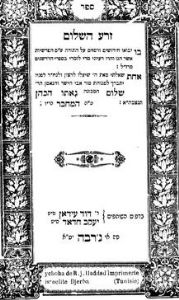A Short Tribute
Hacham Yaakov Cohen Yonathan (Jato) was born to Camrona and Hacham Shalom, known as Jato, in Djerba, Tunisia. After his father died, Hacham Yaakov Cohen Yonathan inherited most of his money and assets yet made little use of them. He contributing most of his wealth to charity and continued to work in his shop at the market, devoting his nights and spare time to Torah study. He would complete the Hoq L’Israel daily portion every day and read the Book of Psalms and the Zohar over the year.
Hacham Yaakov Cohen Yonathan was a paytan and musician who would perform at weddings, circumcisions and similar events, for the wealthy as well as for the poor, seeking no remuneration.
Hacham Yaakov Cohen Yonathan had the reputation of being a humble and modest individual; he refused to have his original commentary published and when on his way to his shop, would keep the books from which he studied out of view so as not to be taken for a Torah scholar.
When Hacham Yaakov Cohen Yonathan’s eyesight began to fail, and his wife would read to him and he would explain; she gradually advanced in her studies and they would study as colleagues. Her name is not mentioned in the book Zera’ Yaakov out of modesty, and her original commentary is referred to as heard “by word of mouth”.
Towards the end of his life, circa 1933, Hacham Yaakov Cohen Yonathan’s yearning for the Land of Israel led him to leave Djerba and he went to live in Zoara, Tripoli with his son Hacham Zion, who officiated as the city’s rabbi. He remained with his son for nearly two years, trying to obtain an immigration permit to the Land of Israel. After succeeding, he went to Tripoli to sail to Alexandria and, from there, to the Land of Israel but was stopped by the ship’s captain, who refused to let him board because of his advanced age. He was forced to return to Djerba, where he died a month later.
Hacham Yaakov Cohen Yonathan passed away on 6 Av, 5696 (1936) in Djerba and was buried there. He wrote a large amount of original commentary on the Torah, some of which was published in his book Zera’ HaShalom. After his death, his sons published Zera’ Yaakov, with additional original commentary, all attributed to his wife.
